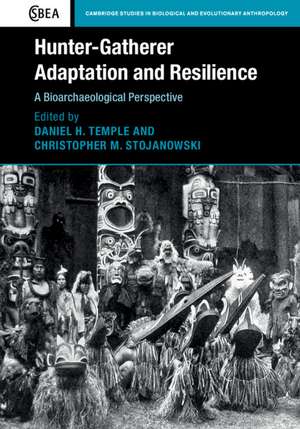Hunter-Gatherer Adaptation and Resilience: A Bioarchaeological Perspective: Cambridge Studies in Biological and Evolutionary Anthropology, cartea 81
Editat de Daniel H. Temple, Christopher M. Stojanowskien Limba Engleză Hardback – 5 dec 2018
Din seria Cambridge Studies in Biological and Evolutionary Anthropology
-
 Preț: 479.80 lei
Preț: 479.80 lei - 9%
 Preț: 700.54 lei
Preț: 700.54 lei - 14%
 Preț: 750.86 lei
Preț: 750.86 lei - 11%
 Preț: 700.59 lei
Preț: 700.59 lei -
 Preț: 390.84 lei
Preț: 390.84 lei - 14%
 Preț: 722.61 lei
Preț: 722.61 lei - 9%
 Preț: 846.79 lei
Preț: 846.79 lei - 11%
 Preț: 460.98 lei
Preț: 460.98 lei - 11%
 Preț: 566.50 lei
Preț: 566.50 lei -
 Preț: 367.91 lei
Preț: 367.91 lei -
 Preț: 356.37 lei
Preț: 356.37 lei - 11%
 Preț: 633.61 lei
Preț: 633.61 lei - 11%
 Preț: 619.90 lei
Preț: 619.90 lei -
 Preț: 396.29 lei
Preț: 396.29 lei -
 Preț: 279.00 lei
Preț: 279.00 lei -
 Preț: 304.74 lei
Preț: 304.74 lei -
 Preț: 371.32 lei
Preț: 371.32 lei -
 Preț: 376.06 lei
Preț: 376.06 lei -
 Preț: 332.66 lei
Preț: 332.66 lei -
 Preț: 421.01 lei
Preț: 421.01 lei -
 Preț: 303.60 lei
Preț: 303.60 lei -
 Preț: 309.27 lei
Preț: 309.27 lei -
 Preț: 376.62 lei
Preț: 376.62 lei - 11%
 Preț: 424.92 lei
Preț: 424.92 lei -
 Preț: 308.50 lei
Preț: 308.50 lei -
 Preț: 317.11 lei
Preț: 317.11 lei -
 Preț: 453.33 lei
Preț: 453.33 lei -
 Preț: 322.41 lei
Preț: 322.41 lei -
 Preț: 433.83 lei
Preț: 433.83 lei -
 Preț: 435.78 lei
Preț: 435.78 lei -
 Preț: 471.93 lei
Preț: 471.93 lei - 11%
 Preț: 474.71 lei
Preț: 474.71 lei -
 Preț: 428.90 lei
Preț: 428.90 lei - 14%
 Preț: 934.70 lei
Preț: 934.70 lei
Preț: 693.77 lei
Preț vechi: 779.51 lei
-11% Nou
Puncte Express: 1041
Preț estimativ în valută:
132.79€ • 138.10$ • 111.28£
132.79€ • 138.10$ • 111.28£
Carte disponibilă
Livrare economică 20 februarie-06 martie
Preluare comenzi: 021 569.72.76
Specificații
ISBN-13: 9781107187351
ISBN-10: 1107187354
Pagini: 404
Ilustrații: 80 b/w illus. 28 tables
Dimensiuni: 177 x 252 x 23 mm
Greutate: 0.95 kg
Editura: Cambridge University Press
Colecția Cambridge University Press
Seria Cambridge Studies in Biological and Evolutionary Anthropology
Locul publicării:New York, United States
ISBN-10: 1107187354
Pagini: 404
Ilustrații: 80 b/w illus. 28 tables
Dimensiuni: 177 x 252 x 23 mm
Greutate: 0.95 kg
Editura: Cambridge University Press
Colecția Cambridge University Press
Seria Cambridge Studies in Biological and Evolutionary Anthropology
Locul publicării:New York, United States
Cuprins
1. Interrogating the alterity of hunter-gatherers in bioarchaeological context: adaptability, transformability and resilience of hunter-gatherers in the past Daniel H. Temple and Christopher M. Stojanowski; 2. Regional continuity and local challenges to resilience among holocene hunter-gatherers of the Greater Cape Floristic Region, South Africa Susan Pfeiffer and Lesley Harrington; 3. Hunter-gatherer persistence and demography in Patagonia (Southern South America): the impact of ecological changes during the Pleistocene and Holocene Valeria Bernal, S. Ivan Perez, María Bárbara Postillone and Diego D. Rindel; 4. The success and failure of resilience in the European Mesolithic Rick J. Schulting; 5. Persistence of time: resilience and adaptability in prehistoric Jomon hunter-gatherers from the inland sea region of Southwestern Honshu, Japan Daniel H. Temple; 6. Biomechanics, habitual activity, and resilience among Southern African hunter-gatherers and herders Michelle E. Cameron and Jay Stock; 7. Biocultural adaptation and resilience in the hunter-gatherers of Lagoa Santa, Central-Eastern Brazil Pedro Da-Gloria and Lucas Bueno; 8. Resiliency among hunter-gatherers in Southern California before and after European colonization: a bioarchaeological perspective Erin E. Bornemann and Lynn H. Gamble; 9. Persistence or pastoralim: the challenges of studying hunter-gatherer resilience in Africa Christopher M. Stojanowski; 10. Ancient mortuary ritual and cultural resilience on the northwest coast of North America Bryn Letham and Gary Coupland; 11. Bioarchaeological evidence for cultural resilience at Point Hope, Alaska: persistence and memory in the ontology of personhood in northern hunter-gatherers Lauryn C. Justice and Daniel H. Temple; 12. Biocultural perspectives on interpersonal violence in the prehistoric San Francisco Bay Area Eric J. Bartelink, Viviana I. Bellifemine, Irina Nechayev, Valerie A. Andrushko, Alan Leventhal and Robert Jurmian; 13. The discovery and rapid demise of the Sadlermiut Charles F. Merbs; 14. When resilience fails: fences, water control, and Aboriginal history in the Western Riverina, Australia Judith Littleton; 15. Models, metaphors, and measures Jane E. Buikstra.
Descriere
Explores the variety of ways in which hunter-gatherer societies have responded to external stressors while maintaining their core identity.
